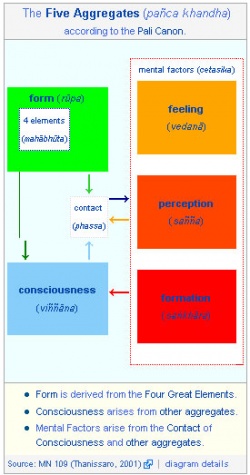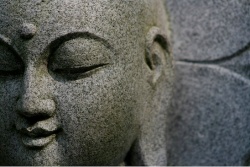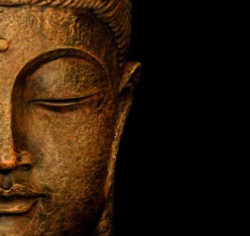Saṅkhāra
Saṅkhāra (Pali; Devanagari: सङ्खार) or Saṃskāra (Sanskrit; Devanagari: संस्कार) is a term figuring prominently in the teaching of The Buddha. The word means 'that which has been put together' and 'that which puts together'. In the first (passive) sense, saṅkhāra refers to conditioned phenomena generally but specifically to all mental "dispositions". These are called 'volitional formations' both because they are formed as a result of volition and because they are causes for the arising of future volitional actions. In the second (active) sense of the word, saṅkhāra refers to that faculty of the mind/brain apparatus (Sankhara-khandha) that puts together those formations. English translations for saṅkhāra in the first sense of the word include 'conditioned things,' 'determinations,' 'fabrications' and 'formations' (or, particularly when referring to mental processes, 'volitional formations').
Conditioned things
In the first (passive) sense saṅkhāra can refer to any compound form in the universe whether a tree, a cloud, a human being, a thought or a molecule. All these are saṅkhāras. The Buddha taught that all such things are impermanent, arising and passing away, subject to change, and that understanding the significance of this reality is Wisdom. Saṅkhāra is often used in this first sense to describe the psychological conditioning (particularly the habit patterns of the unconscious mind) that gives any individual human being his or her unique character and make-up at any given time.
The last words of The Buddha, according to the Mahāparinibbāna Sutta (in English and Pali), were "Disciples, this I declare to you: All conditioned things are subject to disintegration – strive on untiringly for your liberation." (Pali: "handa'dāni bhikkhave āmantayāmi vo, vayadhammā saṅkhārā appamādena sampādethā ti.")
Sankhara-khandha:The builder of lives
In the second (active) sense, saṅkhāra (or saṅkhāra-khandha) refers to the form-creating faculty of mind, often described as "volitional" or "intentional." States The Buddha:
- 'And why do you call them 'fabrications'? Because they fabricate fabricated things, thus they are called 'fabrications.' What do they fabricate as a fabricated thing? For the sake of form-ness, they fabricate form as a fabricated thing. For the sake of feeling-ness, they fabricate feeling as a fabricated thing. For the sake of perception-hood... For the sake of fabrication-hood... For the sake of consciousness-hood, they fabricate consciousness as a fabricated thing. Because they fabricate fabricated things, they are called fabrications.'
In the doctrine of conditioned arising or Dependent origination (paṭiccasamuppāda), saṅkhāra-khandha is understood to be that which propels human (and other sentient) beings along the process of becoming (Bhava) by means of actions of body and speech (Kamma). The Buddha stated that all volitional constructs are conditioned by ignorance (Avijja) of the reality (Sacca) behind appearance. It is this ignorance that ultimately causes human Suffering (Dukkha). The calming of all such fabrications (sabba-saṅkhāra-Nirodha) is synonymous with Enlightenment (Bodhi), the achieving of arahantship.
As ignorance conditions volitional formations, these formations in turn condition consciousness (Viññāna). The Buddha elaborated:
- 'What one intends, what one arranges, and what one obsesses about: This is a support for the stationing of consciousness. There being a support, there is a landing [or: an establishing] of consciousness. When that consciousness lands and grows, there is the production of renewed becoming in the future. When there is the production of renewed becoming in the future, there is future birth, aging & death, sorrow, lamentation, pain, distress, & despair. Such is the origination of this entire mass of Suffering & stress.'
Tradition relates that after The Buddha's complete Enlightenment he uttered the following words (English and Pali):
|
'Seeking but not finding the housebuilder, |
Aneka Jāti samsāraṃ sandha vissam anibhissam |
The 'housebuilder' to which The Buddha refers is just this mental faculty of Sankhāra-khandha whose products, the volitional formations, are conditioned by ignorance.
Mental factors
- See also:Mental factors
Mental factors (Sanskrit: Caitasika; Pali: Cetasika; Tibetan Wylie: sems byung) are formations (Sanskrit: saṅkhāra) concurrent with mind (Sanskrit: Citta). They can be described as aspects of the mind that apprehend the quality of an object, and that have the ability to color the mind.
The Buddha emphasized the need to pacify or appease dispositions rather than eliminate them completely.
Kalupahana states that "the elimination of dispositions is epistemological suicide," as dispositions determine our perspectives. The development of one's personality in the direction of perfection or imperfection rests with one's dispositions.
When preliminary Nibbana with substrate occurs (that is, Nibbana of a living being), constructive consciousness, that is, the house-builder, is completely destroyed and no new formations will be constructed. However, sankharas in the sense of constructed consciousness, which exists as a 'karmically-resultant-consciousness' (Vipāka Viññāna), continue to exist. Each liberated individual produces no new Karma, but preserves a particular individual personality which is the result of the traces of his or her karmic heritage. The very fact that there is a psycho-physical substrate during the remainder of an Arahant's lifetime shows the continuing effect of Karma.
See also: Nibbana#Transcendent knowing
English translations for the term Sankhara
- Activities (Ajahn Sucitto)
- Conditions
- Conditioned things
- Determinations
- Fabrications
- Formations (Bhikkhu Bodhi)
- Karmic formations
- Volitional activities (Gethin, p. 136)
- Volitional formations (Bhikkhu Bodhi)



